- Home
- David Downing
Zoo Stationee Page 22
Zoo Stationee Read online
Page 22
After dropping Slaney off in the city center he drove up Neue Konigstrasse to see if the Wiesners had any news, or any last-minute instructions for his visit. There was none of the former, but Frau Wiesner had written a short letter to her husband.
They wont allow. . . . Russell started to say, but then relented. Ill try, he promised.
Please read it, she said, and if they take it then you can tell him whats in it.
Tell Daddy we love him, Ruth said, her head suddenly appearing around the door to the other room. The voice was brittle, the smile almost unbearable.
I will.
He drove back down Neue Konigstrasse, and stopped at the Alexanderplatz station to call Effi. The phone just rang, so he drove home to Neuenburgerstrasse. Frau Heideggers skat evening was in boisterous swing, but shed pinned a message for him beside the phone: Herr Russell! Your fiancée is working late tonight and early tomorrow morning. She finishes work at six tomorrow evening!
Russell went upstairs and ran a bath. The water was almost scalding, the pain of immersion almost pleasurable.
WEDNESDAY WAS A NICE day for any drive but this one. Berlin looked its best under a pale sun: The Spree sparkled, the windows glittered, the brightly colored trams shone in the graystone streets. While walkers huddled against the brisk cold wind, mouths and ears swathed in wool, the Hanomag proved remarkably snug for a ten-year-old car. As he drove up Brunnenstrasse toward Gesundbrunnen he thanked his lucky stars for the Zembski cousins. More than a thousand kilometers in twelve days, and no sign of a problem.
As he drove over the Ringbahn bridge he could see the Hertha flag flying from the Plumpe grandstand. This was the way he and Effi had come on the previous Friday, but the feeling on that day had been one of leaving Hitlers world behind. Today he was journeying into its heart, or the space where a heart might have been.
Sachsenhausen was only an hours drive from Berlin, a reasonable commute for the Gestapo interrogators who had previously plied their trade in the modern dungeons of Columbia Haus. According to Slaney, the new camp was a lot bigger, but neither he nor any other member of the foreign press corps had ever visited it. They had been shown around a sanitized Dachau in the early days, but that was it.
Ten kilometers short of his destination, Russell pulled into a small town garage for gas and used the stop to read Eva Wiesners letter to her husband. It was simple, touching, to the point. Heartbreaking.
Back on the Stralsund road, a neat sign announced the turnoff to Sachsenhausen Concentration Camp and Re-Educational Facility. Two or three kilometers of newly laid road led through a flat land of pastures and small woods to the gates of the camp. Parallel wire fences ran off to both left and right, one of which was clearly electrified. The gates themselves were flanked by a concrete watchtower and gatehouse.
Russell pulled up beside the latter as a man in Totenkopfverbände uniform emerged with palm raised and a submachine gun cradled in the other arm. Russell wound down the window and handed over his documents. The guard read through them twice, said wait here, and walked back inside the gatehouse. Russell heard him talking, presumably on the telephone, and a few moments later he reemerged with another guard. Get out, he said.
Russell obliged.
Raise your arms.
He did as he was told. As one guard checked his clothes and body for weapons, the other went over the car.
What is this? the first guard asked, taking the letter from Russells coat pocket.
Its letter for the man Ive come to see. From his wife.
Not permitted, the guard said, without apparent emotion. He crumpled the letter in his fist.
Russell opened his mouth to protest but thought better of it.
The cars clean, the other guard reported.
Turn left inside the gate, and report to the Kommandantura, the first guard said. Its the second building on the left. He handed back the documents and gestured to the guard who had now appeared inside the gates to open them. Russell thanked him with a smilewhich was not returnedand drove carefully through the now-opened gates, conscious that they would soon be closing behind him. Turning left, he could see, in a wide space some distance ahead, several hundred prisoners standing in formation. Most had bare arms and heads, and must have been freezing in the cold wind. Two Totenkopfverbände officers were ambling along the front rank, shouting something indecipherable. One had a muzzled Alsatian on a lead.
He stopped outside the two-storey concrete building which bore the signpost KOMMANDANTURA, took one last look at the apparent roll-call, and headed for the door. On either side of the entrance two large pots held the withered remains of what might have been geraniums.
Inside, a middle-aged Gestapo officer looked up from his desk, wordlessly extended a hand for Russells documentation, and gestured him to a chair. As the officer examined the pass and accompanying letter he repeatedly ran his right hand through his thinning hair, as if intent on wearing out what little remained. Picking up the phone with that hand, he switched to using the other on his head. You are needed here, he told someone, and hung up.
A minute later the someonea younger man with a remarkably unintelligent facearrived. Hauptscharführer Gründel will take you to your meeting, the adjutant announced.
Russell stood up. This way, the Hauptscharführer barked, leading him through a door, down a short corridor, and out through another door into the open air. A short walk down a gravel path brought them to another, larger two-storey building, and a small windowless room on the ground floor. Several chairs and a table were arranged around the walls, leaving the center of the room empty. The floor had a thin covering of sawdust.
Why are you so interested in this Jew? the Hauptscharführer asked, sounding almost bewildered beneath the bluster.
He helped a friend of mineyears ago, Russell said shortly.
The Hauptscharführer thought about that, and shook his head. Wait here, he said.
Russell waited, pacing to and fro across the room. There was a dark residue in the center of the floor which could have been dried blood. He squatted on his haunches for a better look, but admitted to himself that he didnt really know what dried blood looked like. It was the sort of thing you needed to know in Hitlers realm, he thought. If the Eskimos had fifty words for snow, the Nazis probably had fifty for dried blood.
The minutes stretched out. At one point a frenzied burst of barking erupted in the distance, and died out with equal abruptness. Almost twenty minutes had gone by when the door opened and Felix Wiesner was pushed inside, the Hauptscharführer close behind him. Russell had expected cuts and bruises, and there were lots of them: One of Wiesners eyes was swollen shut, there were dark bruises on his neck, throat, and cheeks, and there was blood in his hair. But that was just the superficial damage. His right hand was encased in a bloody bandage, concealing God knew what injuries, and the doctor was hunched over, apparently unable to walk upright. He looked, Russell thought, like a man whod just been kicked in the genitals. Many, many times.
He was obviously surprised to see someone he knew. Come, Russell said, helping Wiesner into a chair and feeling the pain it cost him.
The Hauptscharführer, who had taken a chair by the door, watched with contempt.
Can we speak in private? Russell asked, knowing what the answer would be.
No. This bastard has forfeited any right to privacy. You have ten minutes, he added, looking at his watch.
Russell turned to Wiesner. Your wife wrote you a letter, but they confiscated it. She told me to read it in case that happened. She wrote that she and the children love you and are dreaming of the day when you come home.
Wiesner sighed, then made a visible effort to gather himself. Thank you, he said quietly, moving his mouth with obvious difficulty. Why are you here? he asked, as if there had to be more.
To help, if I can, Russell
said. You know what they accuse you of?
Yes.
Did you see this girl?
Wiesner shifted his body in a vain search for comfort. She came to the clinic. Wanted an abortion. Abused me when I said no.
You dont know who gave her the abortion?
No. But look, he said, speaking slowly, making sure the words came out right, that doesnt matter. Thats over. We are all guilty here. He reached out his good hand and laid it on Russells arm. You must tell my wife to go if she can. To save the girls. And Albert if hes willing to be saved. And herself. She mustnt count on my getting out of here. In fact, she must act as if I was already dead. Do you understand? Can you tell her that? Can you make her believe it?
I can tell her.
She knows where my stamp collectionhe used the English phraseis. It would be worth a lot to Stanley Gibbons. And I would be greatly in your debt.
No you wouldnt, Russell said, glancing across at the Hauptscharführer, who was looking at his watch.
I am ashamed to say it, Wiesner continued, still struggling with every word, but I thought Albert was exaggerating about this placethat he had been less than a mensch. Tell him I am sorry, that now I know.
One minute, the Hauptscharführer said.
Dont tell my wife how bad it is, Wiesner said. Tell her Im all right. Theres nothing she can do.
Russell looked at him. I feel like I want to apologize he said.
Why? You have done nothing.
Russell grimaced. Maybe thats why. I dont know if theres anything I can do to help you, but Ill move heaven and earth to get your family out. I promise you that.
Wiesner nodded, as if that were a deal worth having. Thank you, he whispered as the Hauptscharführer got to his feet.
Time, the man shouted with evident satisfaction. You wait here, he told Russell, shoving Wiesner in the direction of the door. Russell watched the doctor shuffle painfully out, arms folded against the wind, the Hauptscharführer demanding greater speed. The door slammed shut behind them.
Russell sat and waited, staring numbly into space, until the Hauptscharführer returned. Back at the Kommandantura he insisted on asking the Gestapo officer whether the doctors account of events had been checked out. The man hesitated, as if wondering whether the offer of an answer could be justified, and decided it could. Our interrogations are not yet complete, he said dismissively.
You mean hes not dead yet, Russell said.
The Gestapo man gave him a thin smile. What happens here is no concern of foreigners, he said.
Several retorts sprang to mind, but silence seemed wiser. I can leave? he asked.
You can leave.
Russell walked outside to the car. The prisoners were still lined up in the distance, the icy wind still blowing. He reversed the car, drove back to the gates, and waited for them to be opened. As he motored out past the gatehouse he saw the crumpled ball of Eva Wiesners letter lying where the wind had blown it, up against the concrete wall. A kilometer or so down the access road he pulled to a stop, slumped forward with his head against the wheel, and let the waves of rage wash over him.
A LITTLE OVER AN HOUR later he was pulling up outside the Wiesners apartment block in Friedrichshain. He sat in the car for a while, reluctant to go up, as if bringing the bad news would make it real. Many of the people walking by looked Jewish, and most of them looked as if theyd seen better times. Did the faces look haunted, or was he just thinking that they should? Could they see the fists coming? The coshes, the belts, the whips?
Russell wearily climbed the stairs and knocked on the familiar door. It opened immediately, as if Frau Wiesner had been waiting behind it. Hes all right, Russell said, the lie sour on his tongue.
The girls faces filled with hope, but Frau Wiesner searched his face, and saw a different truth. They are not treating him badly? she asked, almost incredulously.
Not too badly, Russell said, glancing pointedly at the girls.
Her face sank with the knowledge that he needed to talk to her alone, but she managed a smile as she shooed the girls back into the other room. Tell me how bad it is, she asked, once the door had closed behind them.
Hes been beaten. But not too badly, Russell lied. He has cuts and bruises. What youd expect from those animals.
God save us, she said, her legs buckling.
Russell helped her into a seat, and steeled himself to pass on her husbands words. He gave me a message for you, he began. You must leave the country if you can, you and the children. He hopes he will be released eventually, but for the momentfor the moment, he emphasizedhe says you must act as if he were dead.
He expected tears, but she gave him a look full of defiance. The children, yes, she said. But I will not go.
The children will need you, Russell said. And your husband will not be coming back, he thought.
They will be all right, she said firmly, as if trying to convince herself. In a decent country, they will be all right. Albert is old enough to look after the girls.
Where is Albert?
Out somewhere. But I will make sure that he looks after the girls.
Your husband sent him a message too, Russell said. He says he understands now what Albert must have been through in the camp. He wants Albert to know hes sorry for doubting him.
Oh, God, she said, burying her face in her hands.
Russell pulled her to him, feeling her silent, racking sobs against his shoulder. One other thing, he said when she was finally still. I am going to England tomorrow. For a few days, taking Effis sister to see an English doctor. Your husband asked if I could get his stamps out of Germany, and this seems like an ideal opportunity. If you agree, I can put them in a safety deposit box in London, and leave the key with my agent. Hes trustworthy.
You are sure?
That hes trustworthy? Yes. That I can get them past customs? Not completely, but Im traveling with the wife of a Nazi and two children. It seems like the best chance were likely to get.
She got up and disappeared into the other room, returning a few moments later with a large, soft-covered book called Achievements of the Third Reich: The First Five Years. COLLECT ALL FIFTY FULL-COLOR STICKERS! a splash in the corner announced, and Felix Wiesner obviously had. Stickers displaying busy factories, the Peoples car, Strength through Joy cruise ships and 47 other bounties of Hitlers reign were neatly affixed to their appropriate squares.
The pictures are only stuck around the edges, she explained. Theres a stamp behind each one.
EFFI SEEMED HAPPY ENOUGH to see him, but was, to most intents and purposes, still on the film-set. Russell could have shocked her out of her absorption with an account of his visit to Sachsenhausen, but there didnt seem any point. He gave her a sanitized version of the visit, more sanitized indeed than the one hed given Frau Wiesner. They made love that night in a friendly, somewhat desultory fashion, rather in the way, Russell imagined, that Mother made love to her over-sensitive SA husband.
The dawn was only breaking over the mist-shrouded Havelsee location when he dropped her off, and he arrived outside the British Embassy almost an hour before it opened. The line of Jews seeking visas was already stretching around the corner into Pariserplatz.
Coffee and hot rolls in the Café Kranzler restored his body, but the mornings Beobachter further sunk his spirits. An editorial congratulated the British on their obvious willingness to give up their Empiresarcasm was the highest form of wit in Goebbelslandbefore condemning that same willingness as a clear sign of weakness and decadence. The British had succumbed to humanitätsduselei, humanitarian nonsense. This was not something the Reich would ever countenance.
The line of people eager to escape Hitlers paradise was receding around another corne
r when Russell got back to the Embassy. Martin Unsworth was in a meeting, and had nothing good to tell him when he eventually came out of it. Someone had stuck a to be refused note on Frau Wiesners file, but he didnt know when or why. He was still working on it but, as Russell could see, they were pretty busy. Russells graphic account of his visit to Sachsenhausen elicited sympathy but little else. He had telegraphed the Washington Embassy with a message for Conway, Unsworth said, but had not had a reply. For all he knew, Conway was taking a few days holiday in New York. And in any case, he didnt see what Conway or anyone else could do about one Jew in a concentration camp, no matter how innocent he was, or how badly he was being treated.

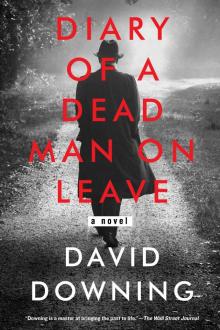 Diary of a Dead Man on Leave
Diary of a Dead Man on Leave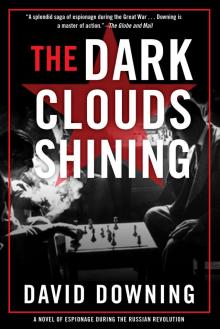 The Dark Clouds Shining
The Dark Clouds Shining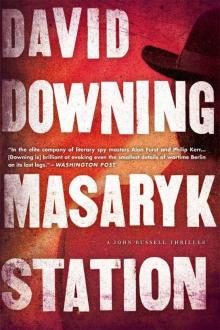 Masaryk Station (John Russell)
Masaryk Station (John Russell)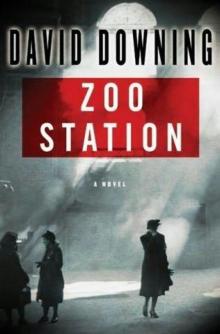 Zoo Stationee
Zoo Stationee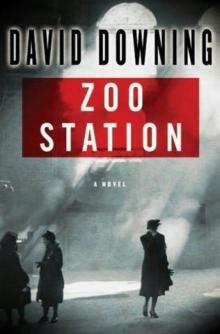 Zoo Station jr-1
Zoo Station jr-1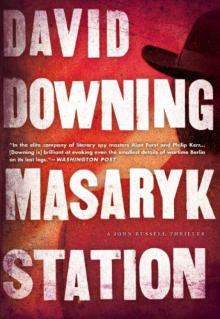 Masaryk Station
Masaryk Station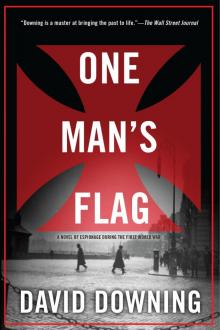 One Man's Flag
One Man's Flag Potsdam Station jr-4
Potsdam Station jr-4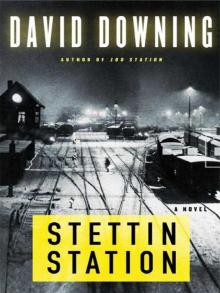 Stattin Station jr-3
Stattin Station jr-3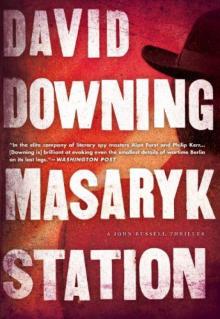 Masaryk Station jr-6
Masaryk Station jr-6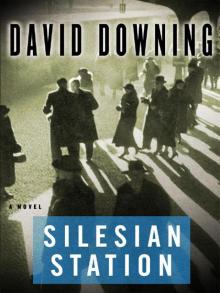 Silesian Station (2008) jr-2
Silesian Station (2008) jr-2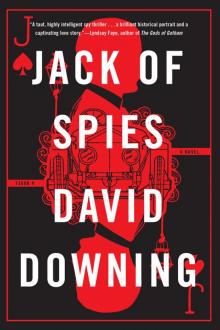 Jack of Spies
Jack of Spies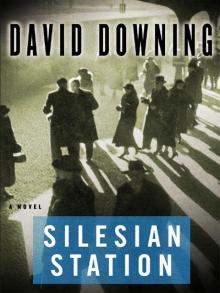 Silesian Station (2008)
Silesian Station (2008) The Moscow Option
The Moscow Option The Red Eagles
The Red Eagles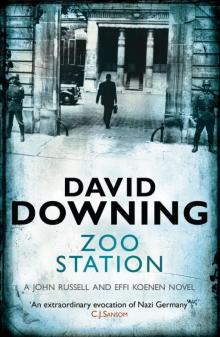 Zoo Station
Zoo Station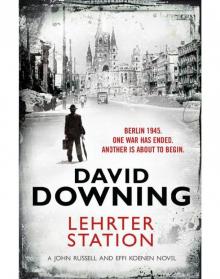 Lehrter Station
Lehrter Station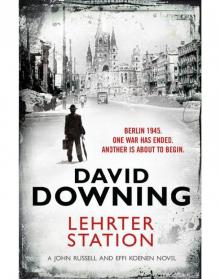 Lehrter Station jr-5
Lehrter Station jr-5